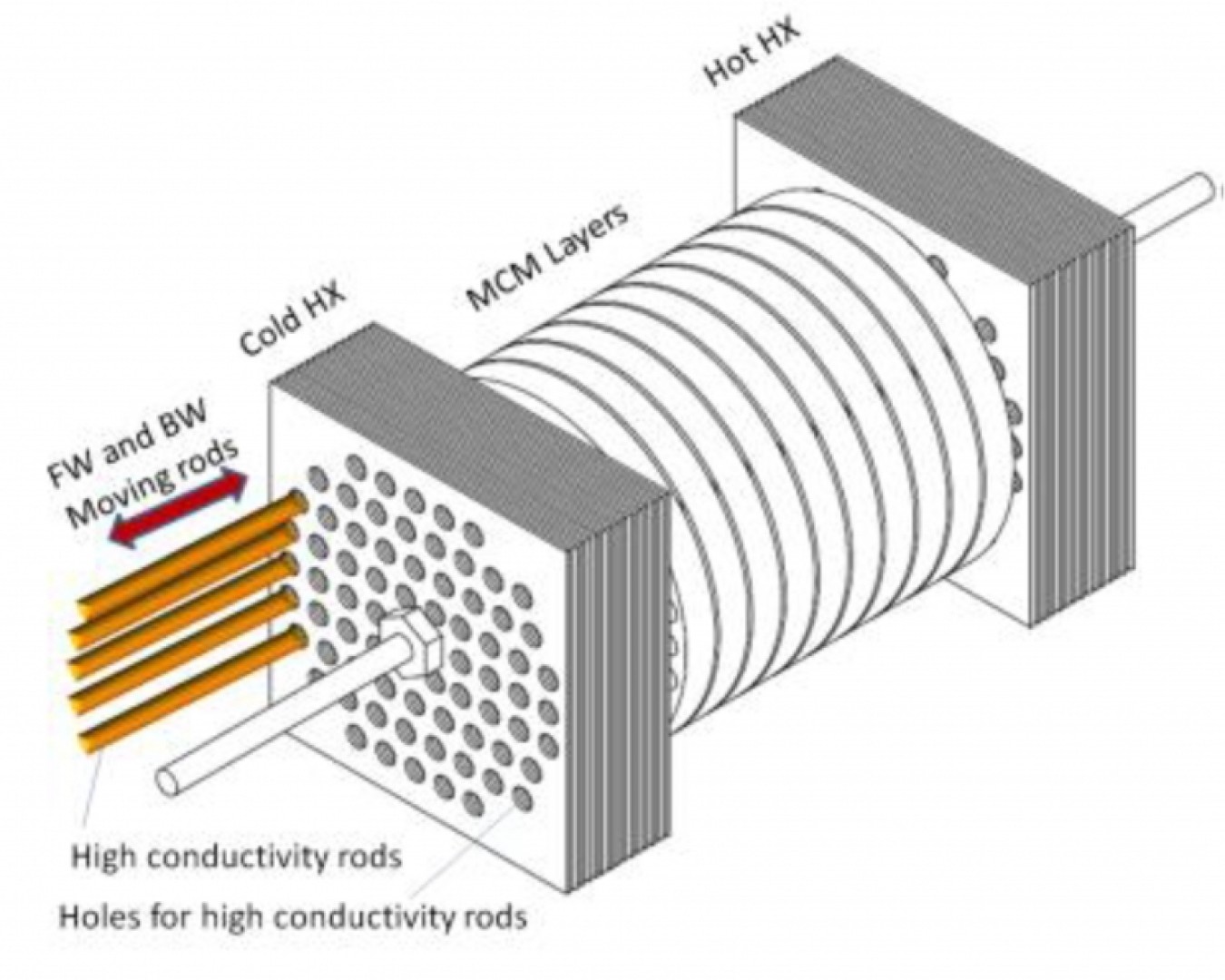Lead Performer: Oak Ridge National Laboratory, Oak Ridge, TN Partner: Vaccumschmelze GmbH & Co. KG., Hanau, Germany
September 10, 2015
Fully solid-state concept with no valves; simple design. Image courtesy of Oak Ridge National Laboratory and BTO Peer Review.
Lead Performer: Oak Ridge National Laboratory, Oak Ridge, TN
Partners: Vaccumschmelze GmbH & Co. KG., Hanau, Germany
DOE Total Funding: $1,360,000
Cost Share: $340,000
Project Term: September 1, 2015 – August 31, 2017
Funding Opportunity: Building Energy Efficiency Frontiers and Innovation Technologies (BENEFIT) – 2015
Project Objective
Current magnetocaloric cooling/heating prototypes employ a heat transfer fluid to exchange heat with the MCM, which typically takes the form of a packed bed of particles, disks, pellets, or sheets. To achieve a large temperature span and cooling capacity, several layers of MCM with a well-defined Curie temperature transition between the heat source and sink are used. The heat transfer fluid is pumped back and forth through the regenerator/packed bed to absorb and release heat from the MCM while it is magnetized and demagnetized, respectively. The use of a heat transfer fluid inherently involves significant parasitic losses because of large pressure drops across the generators. In addition, a complex, expensive, reliable hydraulic control is needed to dispatch the fluid back and forth through different regenerators with a single pump. A stationary MCM regenerator with rotating magnets might be an option; however, from the manufacturing and operation points of view, such a system would have several moving parts and a much larger footprint and is not a first choice for future mass production. The power consumption of the pump and hydraulic controls would adversely affect system performance (leading to more work input and internal heat production caused by viscous heating) and thus would significantly reduce cycle efficiency and capacity.
This project aims to develop a fully solid-state magnetocaloric AC that will result in significantly improved system efficiency and environmental friendliness (i.e., no use of GWP refrigerants) and simultaneously eliminate the need for many expensive system components such as rotating valves and hydraulic pumps. Such a system will significantly reduce the amount of required MCM mass and hence will achieve a higher magnetic flux than conventional AMR systems. The proposed AC will be a small-scale demonstration prototype (500W nominal capacity) similar to a window air conditioning unit for residential applications using the MCMs and technology discussed in this proposal.
Project Impact
Magnetocaloric air conditioning is an emerging technology with the potential for efficiency improvements of up to 25% over conventional vapor compression (VC) systems. ORNL proposes to develop the first fully solid-state magnetocaloric demonstration prototype air conditioner (AC) using a magnetocaloric refrigeration effect rather than a conventional VC cycle, thus eliminating the use of conventional high-global warming potential (GWP) refrigerants. This novel AC will be significantly more efficient than a conventional AC system and will eliminate the need for many expensive system components used in previous magnetic refrigeration systems, such as rotating valves and hydraulic pumps. More important, it will significantly lower the required amount of magnetocaloric material (MCM) mass and will indirectly help achieve a higher magnetic flux, compared with current permanent magnet technologies, as a result. The proposed technology can revolutionize the residential and commercial heating, ventilation, air-conditioning (HVAC) and refrigeration industry by creating unprecedented opportunities for non–VC systems. This will make the U.S. the leader in the advanced HVAC industry and create new jobs in innovative technology. When fully deployed, this technology can save 1.06 quad (4.22 quad × 0.25) of energy for space heating and cooling in the U.S. residential sector alone.
Contacts
DOE Technology Manager: Antonio Bouza
Lead Performer: Dr. Omar Abdelaziz, Oak Ridge National Laboratory

